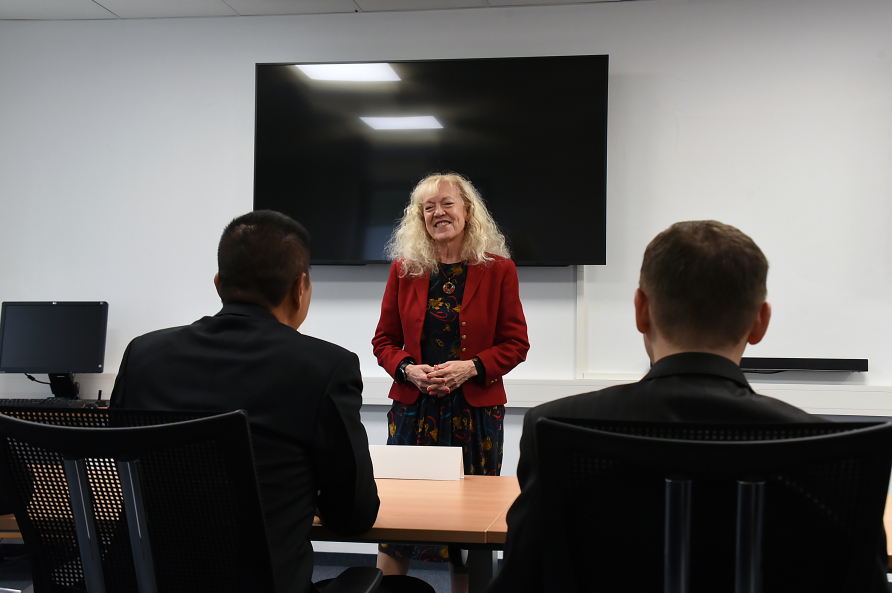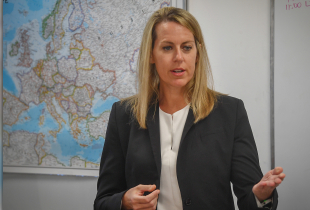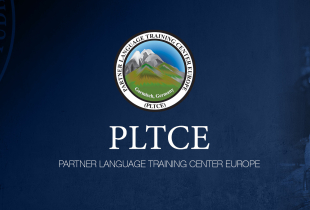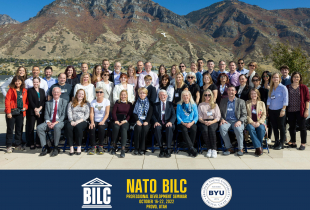Marshall Center civil servant hits 50-year anniversary
For five decades, Peggy Garza has dedicated her career to federal service, advancing language education and international military cooperation. As she celebrates her 50th anniversary in civil service this year, her work in English language training and multinational collaboration remains as impactful as ever.
As head of the English Language Programs Department at the Partner Language Training Center – Europe (PLTCE), Peggy has reshaped English proficiency training for security and defense applications, ensuring partner nations integrate language skills effectively. Over her 25-year career in language education, she has embraced technological advancements to transform instruction in high-stakes military and diplomatic environments. Her contributions directly support theater security cooperation efforts by enhancing the ability of allied and partner forces to communicate effectively, reinforcing multinational operations and interoperability.
"English was the ticket," Garza recalls, referencing the critical role language played in integrating former Warsaw Pact nations into NATO after the collapse of the Soviet Union. Recognizing that effective communication was essential for multinational security cooperation, she helped establish some of the first NATO-aligned English training courses, ensuring that partner forces could operate seamlessly within the alliance.
Born with a passion for education, Peggy’s journey began in upstate New York, where she earned her undergraduate degree in Latin American Studies from SUNY Albany and later a master’s in teaching English as a second language. Early in her career at the Defense Language Institute English Language Center, she navigated the challenge of teaching diverse military audiences, from young Saudi officers with little formal education to seasoned personnel needing to meet NATO language standards.
“What I really love is seeing students use the English skills they learn in class as a foundation for achieving professional success,” she said.
Her early experiences laid the foundation for what would become a hallmark of her career—the integration of language training with strategic international collaboration. Peggy’s work has supported the development of defense sector governance by facilitating training that involves both military and civilian participants, strengthening the capacities of national security establishments.
Following the collapse of the Soviet Union, NATO sought to strengthen ties with emerging democracies. Recognizing language proficiency as a critical tool for security cooperation, Peggy helped develop one of the first online language courses for staff officers preparing for NATO assignments. This initiative aligned with the U.S. security cooperation objectives of building relationships that promote strategic U.S. interests, enhancing allied capabilities for self-defense, and improving multinational operations.
Her pioneering efforts extended into distributed learning initiatives, where she helped digitize traditional instruction, designing modules on military briefings, telephone use, and professional communication.
"We were breaking new ground," she recalls. "Back then, it was a teacher-centric, grammar-based approach. Today, we’re leveraging AI and digital tools to create dynamic, engaging learning environments."
Beyond course development, Peggy has been a driving force in NATO language testing, playing a key role in setting international standards. As NATO’s first representative in global meetings on language testing, she helped shape protocols that now guide partner nations in assessing language proficiency, fostering enduring partnerships among regional nations.
Over the years, Peggy has led international committees, facilitated training workshops, and championed professional development for language educators across NATO and partner nations. These efforts have contributed to developing and sustaining relationships and communities of interest among security practitioners, aligning with broader U.S. security objectives.
Dr. Edelmira Nickels, Director of PLTCE, credits Peggy’s leadership as instrumental to the program’s success.
"Without Peggy’s vision and dedication, the English Language Programs Department would not be as strong and dynamic as it is today. Her passion is contagious," Dr. Nickels said. "She has united linguists and educators from diverse backgrounds, fostering a global community dedicated to improving language interoperability—not just within NATO, but worldwide."
Her leadership in language training directly enhance standards of military preparedness and interoperability, Dr. Nickels added, ensuring U.S. and partner forces remain capable of addressing evolving security challenges.
Beyond leadership, Peggy’s commitment to NATO language teaching and testing has had a lasting impact. "Anyone who has traveled with Peggy knows her dedication is unparalleled—whether during official events or even on a train ride to a seminar," Nickels adds. "She is always connecting the dots, thinking strategically, and strengthening relationships across the NATO language community."
Her work has also been essential in enhancing NATO Joint Terminal Attack Controller (JTAC) communication, ensuring standardized language proficiency for critical military operations. Under her guidance, the English Language Programs Department has expanded significantly, adding five NATO-accredited courses and launching a new workshop focused on statistical analysis of language tests. These initiatives directly support security cooperation by improving partner nations’ ability to train and operate alongside U.S. and NATO forces.
"These achievements are a testament to her initiative and unwavering commitment to our mission," Nickels said.
From chalkboards and acetate transparencies to AI-driven learning platforms, Peggy has witnessed and embraced a complete transformation in language instruction. Yet, despite the technological innovations, she remains a firm advocate for the human element in education.
"Technology has made learning more accessible, but it’s still the human connection that makes it work," she says. "The camaraderie built in in-person training, the exchange of ideas, those remain invaluable."
As she looks ahead—perhaps toward retirement—Peggy’s legacy is already secured in the countless educators and students she has mentored, the international standards she helped shape, and the lasting innovations she introduced. Her career stands as a testament to education, collaboration, and the power of communication in shaping international security and stability.



